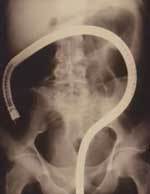by
Barbara Kram, Editor | January 08, 2007

Colonoscopy may
produce complications
like delayed bleeding.
Oakland, CA - The risks associated with colonoscopy should be considered when evaluating its incremental benefit over less invasive screening tests, according to researchers from Kaiser Permanente and the Centers for Disease Control and Prevention (CDC). The study, “Complications of Colonoscopy in an Integrated Health Care Delivery System,” appears in the current issue of Annals of Internal Medicine.
Researchers identified patients receiving colonoscopy and followed them for 30 days for evidence of hospitalization for procedure-related complications.
During colonoscopy, precancerous polyps can be removed and biopsies can be done on tissue samples. The rate of complications following colonoscopy, even colonoscopy without biopsy, is higher than for other colorectal cancer screening tests, including flexible sigmoidoscopy, according to Theodore Levin, MD, a Kaiser Permanente clinician and researcher and the lead author of the study.



Ad Statistics
Times Displayed: 130299
Times Visited: 7399 MIT labs, experts in Multi-Vendor component level repair of: MRI Coils, RF amplifiers, Gradient Amplifiers Contrast Media Injectors. System repairs, sub-assembly repairs, component level repairs, refurbish/calibrate. info@mitlabsusa.com/+1 (305) 470-8013
“Delayed bleeding was not uncommon, suggesting that patients should be advised about their risk and that screening centers should have follow-up procedures in place to monitor delayed complications,” he said.
More than 60 percent of the post-polyp removal bleeding episodes occurred in patients with polyps smaller than one centimeter, the ones least likely to become cancer or develop into a serious problem, said Levin. “Being able to better define which polyps are high risk before removing them, would make colonoscopy a substantially safer procedure,” he said, explaining that techniques to accomplish this continue to improve.
The researchers examined a large sample of community practice gastroenterologists with systematic follow-up within the Kaiser Permanente system. This is important because most prior estimates of colonoscopy complications have come from referral centers or closely monitored clinical trials, which have limited the ability to generalize results to community practice. In addition, a previous study of ambulatory centers relied on the self-report of complications, possibly underestimating them and was unable to evaluate post procedure bleeding.
“The systematic follow-up in this study allowed us to look at post procedure bleeding and also those cases where its occurrence was delayed,” said Levin.
In this study, researchers relied on automated data of Kaiser Permanente, Northern California, an integrated-delivery health care system. Colonoscopy was used to follow up other tests or to conduct surveillance in people with personal or family history of colorectal cancer. Few were performed as the primary screening test.

